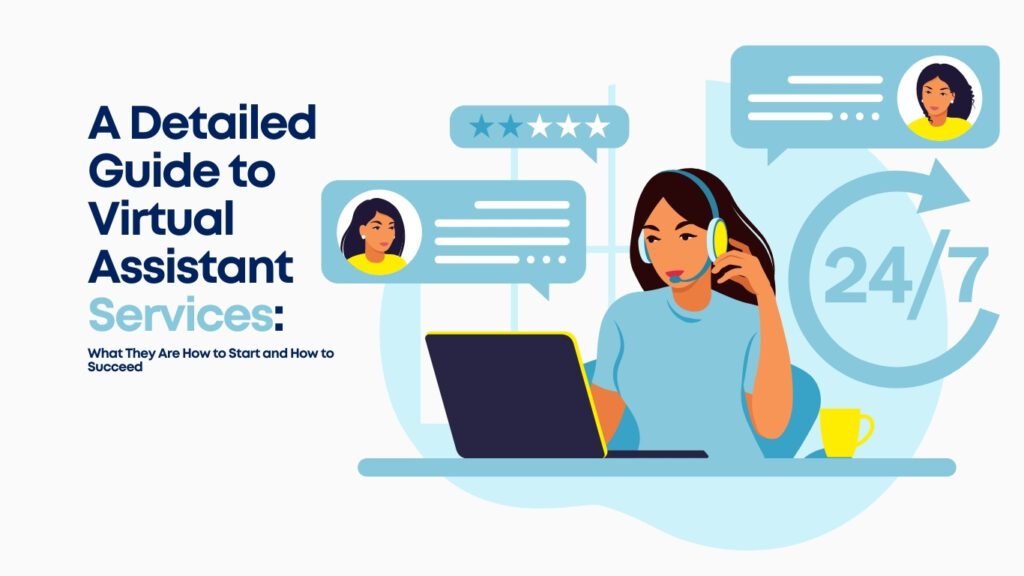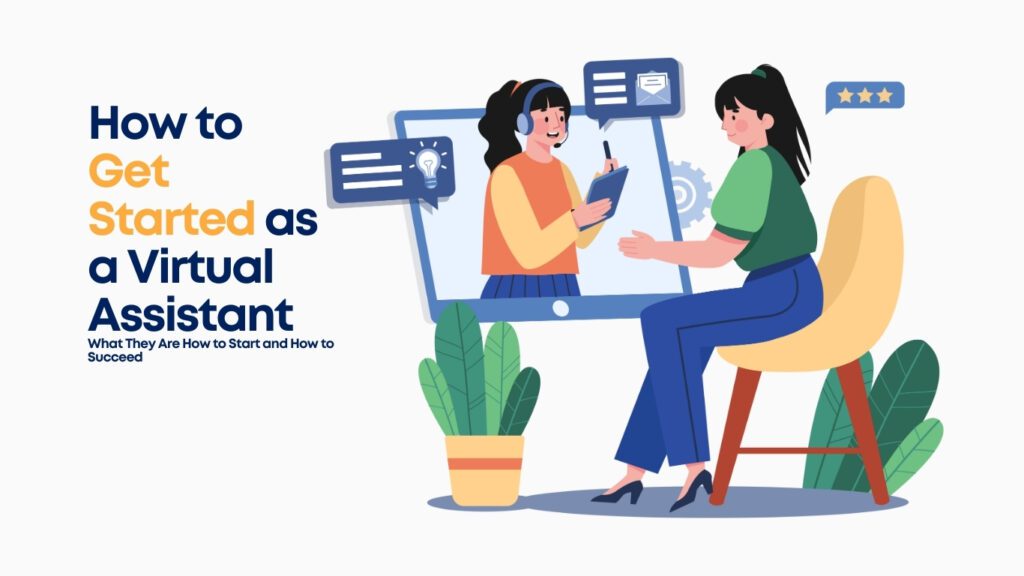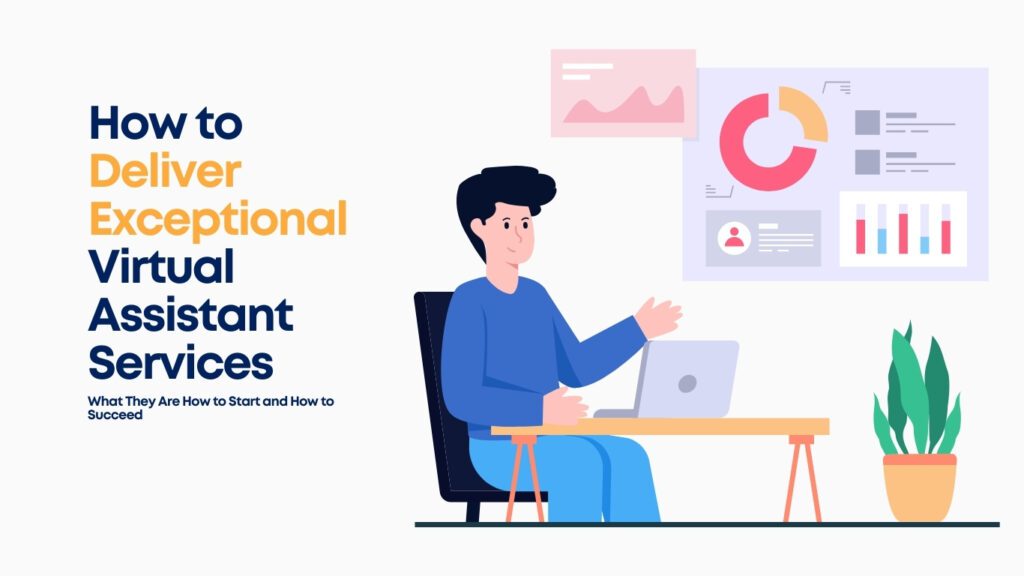As the digital world continues to expand businesses and entrepreneurs are increasingly looking for ways to streamline their operations and maximize productivity. This is where virtual assistant services come into play.

Virtual assistants (VAs) provide remote administrative technical and creative support to businesses allowing companies to focus on their core activities while delegating time-consuming tasks. This guide explores what virtual assistant services are the skills required how to start and how to thrive in this growing industry.
1. What Are Virtual Assistant Services?
Virtual assistant services encompass a wide range of administrative and support tasks that are typically handled remotely. Instead of hiring an in-house employee businesses contract VAs to perform tasks from anywhere in the world. This flexibility has made VA services a popular choice for startups small businesses and even large enterprises looking to reduce costs.
Common Virtual Assistant Services Include:

Administrative Support: Managing emails scheduling appointments handling customer inquiries and data entry.
Social Media Management: Creating scheduling and managing social media posts on platforms like Instagram Facebook LinkedIn and Twitter.
Content Creation: Writing blog posts articles and website copy.
Customer Support: Responding to customer service requests and managing live chat systems.
Data Management: Organizing and updating databases managing spreadsheets and data analysis.
Technical Support: Website maintenance troubleshooting software issues and managing online platforms like Shopify or WordPress.
Project Management: Coordinating with team members tracking project progress and ensuring deadlines are met.
Know about this in detail.
2. Why Are Virtual Assistant Services in High Demand?
The demand for virtual assistant services has skyrocketed due to several factors:
Cost Savings: Hiring a full-time employee comes with costs like salary benefits and office space. VAs as independent contractors are a cost-effective alternative.

Flexibility: Businesses can hire VAs for specific projects or on an as-needed basis making it easier to scale up or down based on demand.
Access to Global Talent: Companies are not limited to hiring locally they can tap into a global pool of talent selecting the best VAs for their needs regardless of location.
Focus on Core Activities: By outsourcing routine tasks to VAs businesses can concentrate on their core functions and strategic growth.
3. Key Skills Needed for Virtual Assistants
Successful virtual assistants possess a diverse set of skills to meet the varied needs of their clients. Here are some of the essential skills that can set you apart:

3.1 Communication Skills
Strong verbal and written communication skills are crucial as most interactions with clients and customers will be virtual. Being able to clearly articulate ideas and provide updates is essential.
3.2 Time Management
VAs often juggle multiple clients and projects making time management a critical skill. Using time-tracking tools and setting clear priorities can help manage workloads efficiently.
3.3 Technical Proficiency
Knowledge of software like Microsoft Office Google Workspace and project management tools like Asana Trello or Slack is often required. Familiarity with social media platforms and basic website management is also valuable.
3.4 Attention to Detail
VAs are often responsible for tasks that require precision such as data entry content editing or scheduling. A keen eye for detail ensures accuracy and helps maintain professionalism.
3.5 Problem-Solving Ability
As a remote worker, a VA should be able to solve minor technical or procedural issues independently. Being resourceful and proactive can greatly enhance client satisfaction.
4. How to Get Started as a Virtual Assistant
Starting a virtual assistant business is relatively easy and requires minimal upfront investment. Here a step-by-step guide to launching your VA career:

4.1 Identify Your Niche
Determine which services you want to offer based on your skills and interests. For example,, if you have a background in customer service you might specialize in email and chat support. If you have a knack for creativity social media management or content writing could be your niche.
4.2 Create a Professional Online Presence
Build a website or create profiles on freelance platforms like Upwork Fiverr or LinkedIn. Your online presence should clearly describe the services you offer your experience and testimonials from previous clients if you have them.
4.3 Set Competitive Rates
Research the going rates for VA services in your niche. Hourly rates for virtual assistants can vary greatly from $10 to $60+ per hour depending on expertise and the nature of services. Start with a competitive rate then adjust as you gain experience and testimonials.
4.4 Invest in Necessary Tools
A computer a stable internet connection and basic office software are essential. Other tools like project management apps (Trello Asana) communication platforms (Zoom Slack) and cloud storage services (Google Drive Dropbox) will streamline your work.
4.5 Start Networking
Join virtual assistant communities on Facebook or Reddit and attend online networking events to connect with potential clients. Consider offering free or discounted services initially to build your portfolio and gather reviews.
5. Popular Platforms for Finding Virtual Assistant Jobs
To succeed as a virtual assistant you need to know where to find clients. Here are some of the most popular platforms for connecting with potential clients:

5.1 Upwork
A large freelancing platform where VAs can bid on job listings. Its competitive but successful bids can lead to long-term clients.
5.2 Fiverr
Allows VAs to create “gigs” showcasing their services. Clients browse the marketplace and choose a VA based on their needs. It’s ideal for offering fixed-price services like social media management or data entry.
5.3 LinkedIn
LinkedIn is a powerful tool for networking with business owners and decision-makers. Regularly posting valuable content can help establish you as an expert in your field.
5.4 Virtual Assistant Agencies
Agencies like Belay Time Etc. and Boldly connect VAs with clients directly. They may take a percentage of earnings but can provide a steady stream of work.
5.5 Social Media
Facebook groups and Instagram can be effective platforms for finding VA work, especially within niche industries or communities.
6. How to Deliver Exceptional Virtual Assistant Services
To thrive as a VA and ensure client retention focus on delivering outstanding service. Here are some best practices:

6.1 Communicate Regularly
Set up regular check-ins with clients to update them on progress. Use tools like Zoom for video calls or Slack for daily communication to stay in sync with client needs.
6.2 Be Proactive
Anticipate client needs and offer solutions before problems arise. For instance, if you notice that a client’s email marketing could be improved suggest ways to streamline or enhance it.
6.3 Meet Deadlines
Always deliver work on time. This builds trust and reliability which can lead to more work and referrals. If you are unable to meet a deadline communicate as early as possible.
6.4 Stay Updated on Industry Trends
Invest in online courses or workshops to improve your skills. As new software and tools emerge staying up to date ensures you can offer the best possible services to clients.
6.5 Request Feedback
Ask clients for feedback to understand where you excel and where improvements are needed. Positive reviews can help you attract new clients while constructive feedback can help you grow.
7. How to Scale Your Virtual Assistant Business
Once you have a steady stream of clients consider scaling your business to increase earnings:

7.1 Outsource Work
As your workload grows you can hire other VAs to help with certain tasks. This allows you to take on more clients and offer a wider range of services.
7.2 Develop Premium Services
Offer premium packages that include additional services such as social media audits CRM management or advanced analytics. Premium services can attract clients willing to pay more for specialized skills.
7.3 Build Long-Term Relationships
Focus on building strong relationships with clients as retaining clients is easier and more cost-effective than constantly finding new ones. Offer loyalty discounts or additional services to your long-term clients.
7.4 Create a Brand
Develop a brand for your VA business with a professional logo consistent color scheme and branded content. This helps you stand out and appear more credible to potential clients.
8. Challenges of Being a Virtual Assistant and How to Overcome Them
While being a VA offers flexibility and independence it also comes with challenges:

Isolation: Working remotely can be isolating. Stay connected with other VAs through online communities and take breaks to avoid burnout.
Inconsistent Income: Income can fluctuate especially for new VAs. To stabilize your earnings seek long-term contracts and retainers.
Client Management: Managing multiple clients can be tricky. Use project management software to keep track of deadlines and client requirements.
9. Conclusion: Is Becoming a Virtual Assistant Right for You?
Virtual assistant services offer a unique opportunity to earn a living while working from anywhere in the world. If you have strong communication skills are self-disciplined and enjoy helping businesses grow a career as a VA could be a great fit. By offering specialized services building a solid online presence and continuously improving your skills you can carve out a successful and sustainable career in the virtual assistant industry.
The demand for virtual assistants shows no signs of slowing down making now an ideal time to start or grow your VA business.
Q&A Guide: Virtual Assistant Services
Here’s a comprehensive Q&A guide that addresses common questions about becoming a virtual assistant offering VA services and making a success out of this career path.
1. What Is a Virtual Assistant?
Q: What exactly is a virtual assistant and what do they do?
A: A virtual assistant (VA) is a professional who provides remote support to business entrepreneurs and professionals. VAs handle a range of tasks such as administrative support customer service social media management content creation data entry and technical support. They help businesses operate more efficiently by taking on tasks that can be done from anywhere with an internet connection.
2. How Do I Become a Virtual Assistant?
Q: What are the steps to becoming a virtual assistant?
A: To become a virtual assistant follow these steps:
Identify the skills and services you want to offer.
Create a professional online presence such as a website or social media profile.
Set competitive rates based on your skill level and industry standards.
Join freelance platforms like Upwork or Fiverr to find clients.
Network with business owners and participate in VA communities to grow your client base.
3. What Skills Are Needed to Succeed as a Virtual Assistant?
Q: What skills do I need to be a successful virtual assistant?
A: Essential skills for virtual assistants include strong communication time management attention to detail technical proficiency (such as using Microsoft Office Google Workspace or social media platforms) and problem-solving abilities. Being organized and adaptable is also crucial as VAs often juggle multiple clients and tasks.
4. How Much Can Virtual Assistants Earn?
Q: What is the earning potential for a virtual assistant?
A: Earnings can vary based on the services you offer your level of expertise and the clients you work with. Rates generally range from $10 to $60 per hour. Some VAs charge flat fees for specific services or offer monthly retainer packages. As you gain experience and specialize in certain niches you can increase your rates and potentially earn a full-time income.
5. What Types of Tasks Can a Virtual Assistant Handle?
Q: What specific tasks do virtual assistants typically perform?
A: VAs can handle a wide range of tasks including:
Administrative Support: Email management calendar scheduling and data entry.
Social Media Management: Posting scheduling and engaging with followers.
Content Creation: Writing blog posts website copy and creating graphics.
Customer Service: Managing customer inquiries responding to emails and handling chat support.
Technical Support: Website maintenance and troubleshooting software issues.
6. Where Can I Find Clients as a Virtual Assistant?
Q: What platforms can I use to find VA jobs?
A: You can find virtual assistant jobs on platforms such as Upwork Fiverr LinkedIn and specialized VA agencies like Belay and Boldly. Social media channels particularly Facebook groups can also be useful for connecting with potential clients. Additionally networking within online communities and participating in forums can help you find job opportunities.
7. How Do I Set My Rates as a Virtual Assistant?
Q: How do I determine what to charge for my services?
A: To set your rates research the industry standards for the services you offer. Consider your experience level the complexity of the tasks and the value you bring to clients. You can start with a lower rate to attract initial clients and raise it as you gain experience and testimonials. Hourly rates typically range from $10 to $60 but you can also offer package deals or retainer contracts for consistent work.
8. What Are the Benefits of Being a Virtual Assistant?
Q: Why should I consider becoming a virtual assistant?
A: The main benefits of being a VA include:
Flexibility: You can work from anywhere and set your own hours.
Variety of Work: You have the opportunity to work with different clients and industries.
Low StartUp Costs: The initial investment is minimal typically just a computer and internet connection.
WorkLife Balance: You have control over your workload and schedule.
9. How Can I Stand Out as a Virtual Assistant?
Q: What can I do to differentiate myself in the competitive VA market?
A: To stand out focus on building a niche or specialized skill set that is in high demand such as social media management or SEO optimization. Offer exceptional customer service communicate effectively and consistently deliver work on time. Having a well designed website or portfolio and collecting positive testimonials from clients can also set you apart.
10. What Tools Do Virtual Assistants Use?
Q: What tools and software are commonly used by virtual assistants?
A: VAs use a variety of tools to stay organized and communicate with clients. Common tools include:
Project Management: Trello Asana Monday.com.
Communication: Slack Zoom Microsoft Teams.
File Storage: Google Drive Dropbox.
Social Media Management: Buffer Hootsuite Canva.
Time Tracking: Toggl Clockify.
11. How Can I Market My Virtual Assistant Services?
Q: What are effective strategies for marketing my VA business?
A: You can market your VA services by creating a professional website using social media to showcase your skills and joining online communities related to entrepreneurship and small businesses. Offering free or discounted services initially can help build a portfolio and attract testimonials. Networking at virtual events or webinars can also help you reach potential clients.
12. Is It Possible to Work as a VA Part-Time?
Q: Can I be a virtual assistant part-time while keeping my full-time job?
A: Yes many VAs start part-time and gradually transition to full-time as their client base grows. Offering flexible hours allows you to balance VA work with other commitments. Start by taking on a few clients and scale up as you become more comfortable with the workload.
13. What Challenges Do Virtual Assistants Face?
Q: What are the common challenges of being a VA and how can I overcome them?
A: Common challenges include:
Isolation: Working remotely can feel isolating so make time for social activities or join online VA communities.
Inconsistent Income: To manage fluctuations and secure long-term contracts or retainers.
Time Management: Use tools like Google Calendar and time-tracking apps to organize tasks and meet deadlines.
14. How Can I Scale My Virtual Assistant Business?
Q: What steps should I take to grow my VA business?
A: To scale your VA business you can hire subcontractors to help with tasks develop premium service packages and focus on building long-term relationships with clients. You might also consider offering coaching services or creating digital products like ebooks or courses for other aspiring VAs.
15. What Are the Best Niches for Virtual Assistants?
Q: Which niches have high demand for virtual assistants?
A: High-demand niches for virtual assistants include:
Social Media Management: Managing accounts creating content and running ads.
Ecommerce Support: Managing online stores handling customer service and updating product listings.
Executive Assistance: Calendar management travel planning and email filtering.
Content Creation: Writing blogs editing videos and designing graphics.
Real Estate Virtual Assistants: Handling property listings client follow-ups and managing CRM systems.
This Q&A guide covers the essential aspects of becoming a virtual assistant providing insights for anyone interested in starting or expanding their VA services. Whether you are just beginning your VA journey or looking to refine your skills these answers will help you navigate the path to a successful career in this field.

Pingback: A Guide to Grow and Monetizing Pinterest - AP Design Blog